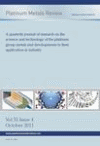-
oa Rhodium Plated Uniselectors
Improved Contact Performance At Low Voltages
- Source: Platinum Metals Review, Volume 4, Issue 2, Apr 1960, p. 65 - 65
-
- 01 Jan 1960
Preview this article:






Rhodium Plated Uniselectors, Page 1 of 1
< Previous page Next page > /docserver/preview/fulltext/pmr/4/2/pmr0004-0065-1.gif
There is no abstract available.
© Johnson Matthey


